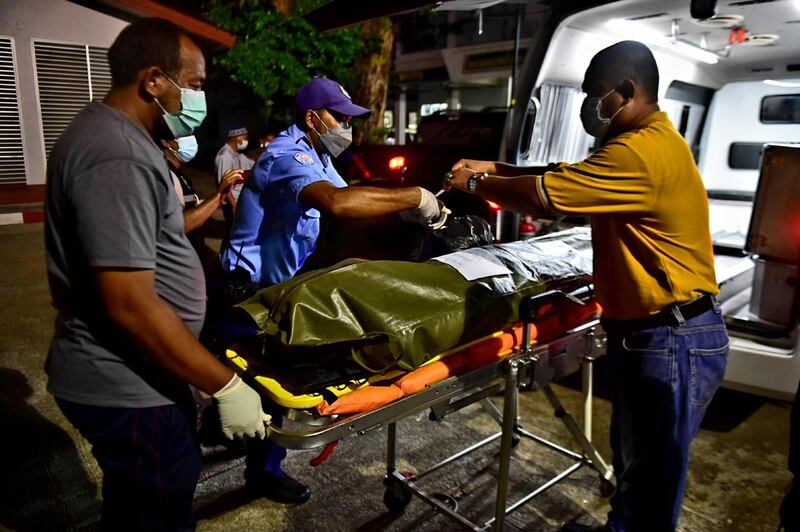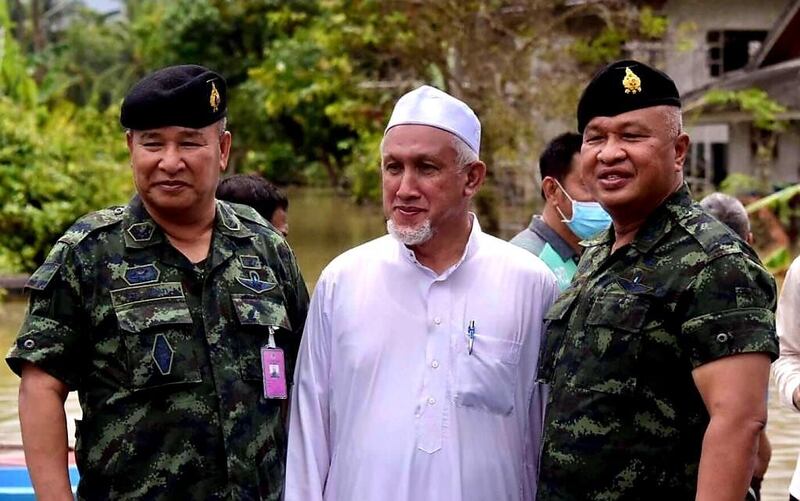People in Thailand’s insurgency-torn Deep South say they have little hope that in-person peace talks resuming next week for the first time in nearly two years will achieve a breakthrough, but experts say it is a step toward building trust.
Thai negotiators are expected to meet in Malaysia Jan. 11-12 with the separatist Barisan Revolusi Nasional (BRN) rebels, the most powerful separatist group in the majority-Muslim Deep South, to resume in-person talks disrupted by the COVID-19 pandemic.
In the southern border region, a former BRN operative said he did not trust the process.
“The dialogue for peace or negotiation, whichever term it is, [has] never made any progress. It is a waste of time. It failed for so many years, and they keep talking about the same old things,” he told BenarNews on the condition of anonymity as he feared for his safety.
“The military invited me to meet them yesterday [Thursday], but they did not talk about how to fix any problems at all. How can we achieve long-term peace? They are not sincere,” he told BenarNews.
Kamjorn Awae, a 36-year-old native from Yala province, said she was “not interested” in the peace talks.
“It is just a theater. Officials don’t want peace because the violence keeps the budgets coming,” she told BenarNews.
“They use the violence to get the budget for so-called development projects, covert operations, and fighting against separatist insurgents.”
Nurman Waeyusof, a 19-year-old resident of Pattani, also does not expect much from the talks, except more violence in the lead up to them.
“Every time they prepare for talks, more attacks take place, and local people suffer more,” Nurman told BenarNews.
“Earlier, I had expected the violence to be gone by now, but now I have just given up,” Nurman told BenarNews.
Since Dec. 23, when news of the face-to-face peace talks broke, there have been at least 15 attacks.
On Friday as well, four rangers traveling in a patrol truck were injured in a roadside bomb explosion in the Nong Chik district of Pattani province, police said. In a separate incident, a local government official was also shot dead in Pattani, but it was not clear who was behind the attack.
Police said it was a show of strength by BRN rebels ahead of the talks.
The Deep South encompasses Pattani, Narathiwat, Yala provinces and four districts of Songkhla province. Since the insurgency reignited in January 2004, more than 7,000 people have been killed and 13,500 others injured in violence across the region, according to Deep South Watch, a local think-tank.
The armed separatist movement against Buddhist majority Thailand began in the 1960s. The movement’s primary demand had been independence for the region.
A formal peace process to solve the issue began in 2013, but it never progressed.

Thai authorities secure the bagged body of Sufian Yusof, a slain insurgent suspect, in Narathiwat province, Thailand, Oct. 13, 2021. [BenarNews]
7 members on each side
Meanwhile, Lt. Gen. Thira Daehwa, the secretary of Thailand’s Peace Dialogue Panel, said the talks were a necessary step.
“In the past two meetings, we were building mutual trust,” Thira, who is also deputy commander of the 4th Army Region which covers the Deep South, told BenarNews.
“We spoke in a foreign country, not using Thai as an official language. We spoke the words which were translated into Malay. If they were skeptical about any issues, we paused and resumed the talk when they were ready,” he said.
Thira said the rebels had back then asked for Deep South security checkpoints to be removed.
“We told them that we could do so only if they stopped attacking; the checkpoints were aimed at intercepting you. Had you not attacked, there wouldn’t be any checkpoints,” he said.
He said next week’s talks brokered by Malaysia would see seven members on each side. The Thai side will be led by Gen. Wanlop Rugsanaoh, the peace talks panel chief, he said.
“Their side also has seven members, led by Hipni Mareh [also known as Anas Abdulrahman],” Thira said, adding that independent observers would also be present.
Thai officials and BRN representatives last met virtually in February 2021, and the last face-to-face discussions – two rounds of them – took place in Kuala Lumpur in March 2020, around the time of the first full-blown onset of the coronavirus pandemic in Malaysia.

Lt. Gen. Thira Daehwa (left), deputy commander of the 4th Army Region, meets with an imam (center) during a religious ceremony in Yala province, Thailand, Nov. 13, 2021. [BenarNews]
‘Peace talks are a lengthy process’
A report published this week cited a government source as saying that the BRN had submitted a ceasefire proposal in May.
Researcher Rungrawee Chalermsripinyorat, based in the Deep South, is the author of the Counter Terrorist Trends and Analysis report published by the S. Rajaratnam School of International Studies in Singapore.
She said there were three main components that both sides had agreed to: “Reduction of violence, the search for a political or administrative solution, and the inclusion of various stakeholders into the peace dialogue.”
“Peace talks are a lengthy process, and so one should not expect any tangible outcome from the first meeting,” said Rungrawee, a lecturer at the Prince of Songkla University.
“It is likely to be a preparatory meeting for several more rounds of talks to come.”
In the report, she said that BRN had “proposed the establishment of an autonomous “Patani Darussalam,” in which the Patani people have the right to design their education and economic systems. In addition, the community’s Malay language and identity were to be officially recognized and preserved.”
Rungrawee said BRN was willing to discuss various forms of political and administrative solutions.
“I think that the BRN senior members are realistic enough, and they are willing to negotiate for a political solution short of independence,” she said.
“But they will never publicly announce that the BRN has abandoned its call for independence.”
